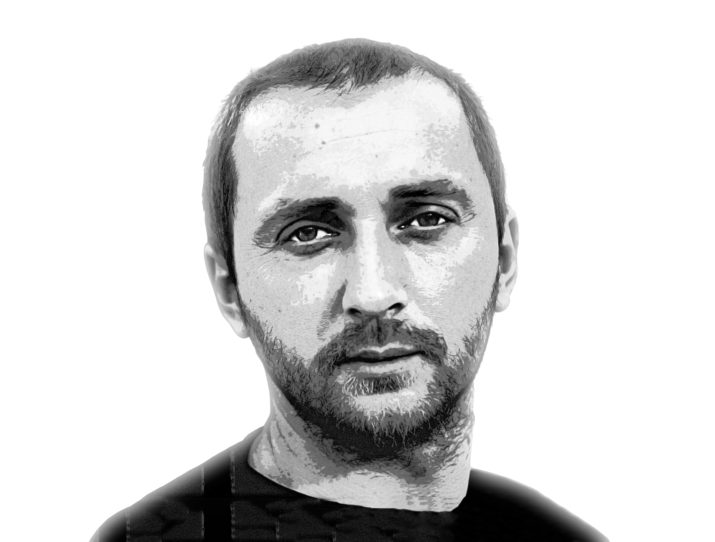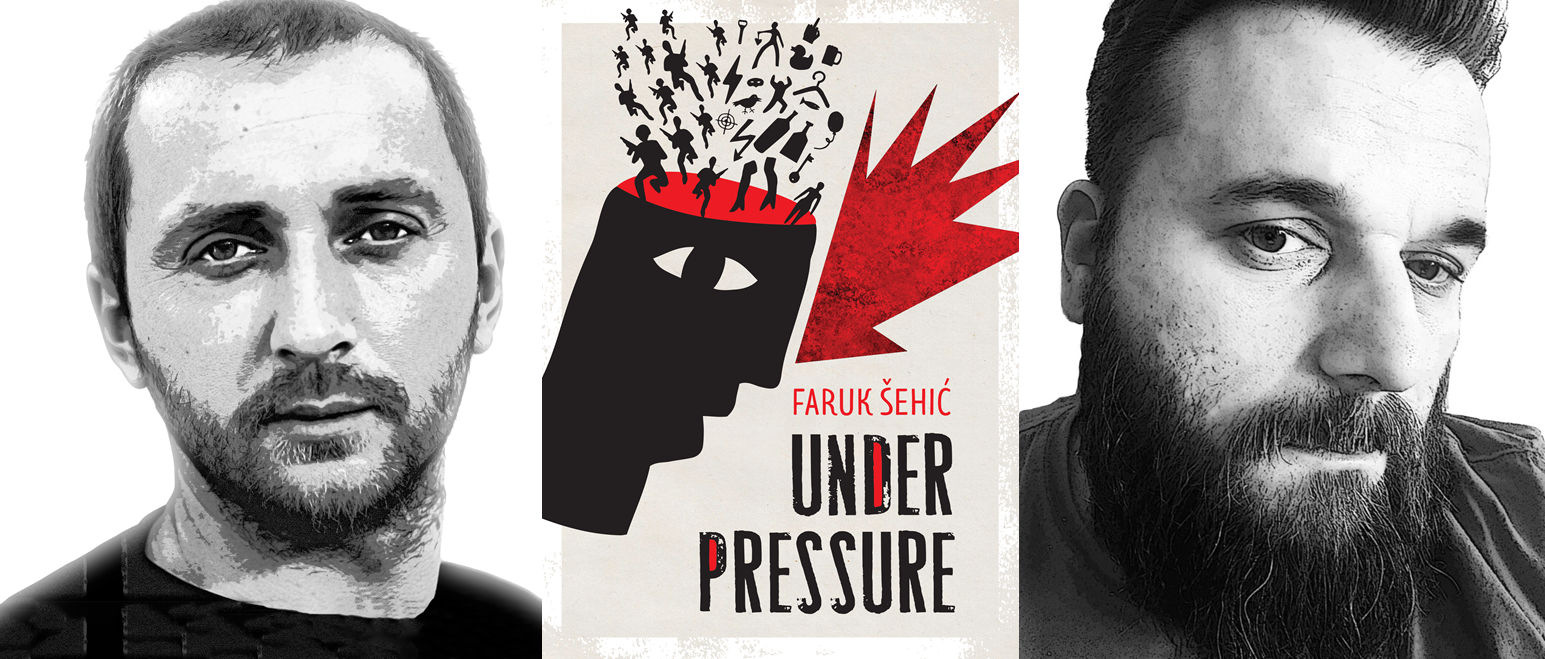

Translated from the B/C/S by Mirza Purić.
This is part of our special feature on Crime and Punishment.
1.
They’ve brought us to the front line. Mud and fog everywhere. I can barely see the man in front of me. We almost hold onto each other’s belts lest we get lost. We pass between burning houses. The file trudges on along rickety fences. The mud sticks to our boots, stretches like dough. The lines you see for the first time are the best. Everything is new, unusual and hairy as fuck. Especially when you take charge of a position at night, and the next day, in daylight, you realise you’re sitting on the tip of a nail.
Charred beams are falling off roofs, sizzling in the mud. We trudge up a big slope. The grass is slimy with fog. Whenever someone falls, he brings the file to a halt and, as a matter of course, curses a blue streak at the motherland and the president. The very thought that we would sleep out in the open flares up my haemorrhoids. The guide, a military policeman, brings us up to the top of the bump. Emir and I take a shallow trench in which we find: a mattress and a quilt, mud-slarted, and a few fags, smoked down to the filter, nervously stuck into the soil.
– All right lads! Nitherin’, innit? – a voice reaches us from the right-hand side.
– Come over and I’ll tell tha – replies Emir lying on the mattress.
A silhouette approaches from behind.
Hops into the trench.
– I’m from t’ third battalion – he tells us as we shake hands.
– Got a fag?
I open a cigarette case full of Gales, unsmokable Colombian rubbish.
– Ahn’t they gonna see us if we smoke? – asks Emir.
– Neh. They’re far from ’ere, t’ fog’s thick.
Emir and I both light up, as if by order.
– Nah then, what’s t’ lie of t’ land? I ask.
– Is it ’airy?
– They ploughed ’ill over with shells earlier today. A fighter from company B ’ad ’is cheek blown off by shrapnel. On Metla, a fell twice t’ size of ours, they ’ave a coupla ZiS anti-tank guns. They can shoot us like clay pigeons – Third Bat-Boyo recounts slowly.
– So, survivors will eat with golden spoons – Emir heckles.
– Ain’t as bad as it looks – Third Bat-Boyo comforts him – gotta die someday anyroad.
Fear creeps into me like mould. It’s shrapnel shave tomorrow.
***
Your life line is interrupted in two places. You’ll be wounded twice, once severely, a Gipsy woman told me on one occasion. Dževada tossed the beans, read them, concluded: a trip abroad is in your future, and glad tidings from afar. She’d tell that to everyone, since we were surrounded from all sides, and we wanted to escape the siege, that is, travel abroad. Glad tidings from afar, that would usually mean a girlfriend who happened to be outside the ring when the siege started, or relatives who live in Germany and send money.
I laid down a hierarchy of things:
- war
- alcohol
- poetry
- love
- war again
Favourite ditty: Bed, you wonderful device, sleeping in you feels so nice.
Stupidest quote: War is delightful to those who have had no experience of it, Erasmus of Rotterdam.
Favourite colour: Blue, all shades of.
Favourite book: Plexus by Henry Miller.
Favourite beverage: Home-distilled rakija.
Favourite weapon: Hungarian Kalashnikov, ser. no. SV-3059.
Favourite dish: A bottle of rakija and a packet of fags.
Favourite quote: To become immortal, and then die, Jean-Pierre Melville.
Unfulfilled wish: For shrapnel to scar my face, so I look badass when I walk into a bar.
Then I fell asleep under the muddy quilt.
2.
– Fiver says Steelio will make it across t’ field.
– Does it count if ’e’s wounded, or does ’e ’ave to be unscathed?
– As long as ’e makes it to that white ’ouse.
Steelio, thus nicknamed because of his studded heavy metal leather bracelet, is lying behind an openwork concrete fence. He’s covered his head with his hands. Fine concrete dust is settling on his hair. He’s made it exactly halfway to the cover. Bullets from an M84 machinegun hit the concrete posts, whizz through the gaps, stick into the ground. Steely gets up, takes a running start and is brought down by a burst of fire. The gamblers sit underneath a quince tree deep in the lee of a four-storey house.
– Steely, tha alive?
– Alive my arse, ’es not movin’, ’es not even groanin’.
– Well it’s ’is own bloody fault, nobody forced ’im ’ave a dash in daylight, coulda waited for nightfall, the third observer gets a word in.
Steelio gets up again, moves his stumpy legs with all his might. It looks like he’s running on the spot, but then he finally takes off from his starting position. His mullet is fluttering in the wind. The M84 is doing its thing, but Steelio finishes like Ben Johnson.
– Go on, gieus t’ fiver.
– Fuk off.
– Well, did ’e make it or what?
– ’E did, aye.
– Fair and square?
– Fair and square, aye.
– Absolutely romantic?
– Absolutely romantic.
Steelio, leaning on the cold wall of the house, takes broken cigarettes out of his pocket. With his shaky fingers he puts half a cigarette in his mouth and lights up. Fixes his hair. Flicks dust and soil off his uniform. Blood returns to his face. Night falls like a trump card.
3.
Zgemba is flicking bits of human brain off the phyllo pie with his fingernail. He’s tearing pieces off with his right hand, dipping them into salt and putting them in his mouth. With his left hand he’s noshing cheese curds, from a white plastic bag splattered with a mixture of blood and brains. His mug is sooty from cartridge gas. In his lap he has a 7.62 mm light machine gun. Five minutes ago this trench was occupied by the autonomist rebels. A still warm corpse is hanging over the breastwork. A burst blew half of his skull off. I turn him on his back. From the inside pocket of his army green jacket I take out his wallet. I look at a passport-size photograph of him. He had a receding hairline. Large, melancholy eyes. With the sharp edge of the photograph I floss out bits of apple from between my teeth.
***
In the middle of the action Deba lit a fire behind one corner of a house to dry his socks. He had left his rifle leaning against the wall at the other end of the house. Autonomists launched a counterattack. They caught Deba alive and unarmed. Tied his hands behind his back with steel wire and shot him behind the shed.
***
That evening, after we were relieved, we went to a kafana. We drank at the expense of the Fifth Corps, meaning for nowt. Zgemba chucked blue valiums into a pitcher of rakija. We lapped it up from large tumblers. The kafana keeper brought meze, smoked beef and cheese, on the house. He had a good-natured mug. He seemed a seasoned host and caterer. The waitress, a Romanian, complained to him that we were drinking for nowt. He reassured her. Her teeth protruded from under her lips, spaced out like those on a rake. She said she used to date a bloke from our brigade, who they used to call Pekar, apparently he was a baker by trade. After a few litres of rakija we started trashing the kafana. We shot the mirror and the bottle shelves above the bar. Muffled by the noise, a turbo folk number was cheeping from the boom box. I tried to hit a fly swatter that was hanging from a nail driven into the wainscoting. In the beer garden we scattered the plastic chairs and tables. We butt-stroked a few locals who spoke up against our actions. We disarmed three policemen, lined them up in front of a hair salon. The kafana keeper drove us in his Lada to the school where we were stationed, ten kilometres from the kafana. It started pouring outside. The wipers were sliding across the windscreen like two blood pressure meter pointers. Nothing else of note happened that evening.
Faruk Šehić (1970) was born in Bihać, Bosnia and Herzegovina. He studied veterinary medicine in Zagreb until the outbreak of the Bosnian War. At age 22 he voluntarily joined the Bosnian Army and led a unit of 130 men as a lieutenant. After the war he studied literature and started a successful career as a poet and fiction writer. His 2011 debut novel Knjiga o Uni (Quiet Flows the Una) has won a number of prestigious literary prizes in the former Yugoslavia, as well as the 2013 European Union Prize for Literature. His works have been widely translated in Europe. He lives in Sarajevo and writes columns for national and regional magazines.
Mirza Purić is a literary translator working from German and B/C/S. He serves as a contributing editor with EuropeNow and in-house translator with Sarajevo Writers’ Workshop. From 2014 to 2017 he was an editor-at-large with Asymptote. He has several book-length translations into B/C/S under his belt and his shorter translations into English have appeared in Asymptote, H.O.W., EuropeNow and PEN America, among other places. He plays Bass VI and baritone guitar in a band.
Published on November 8, 2018.




